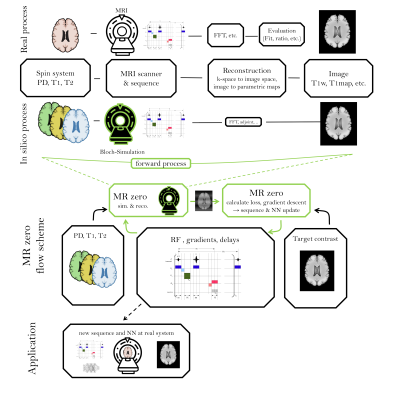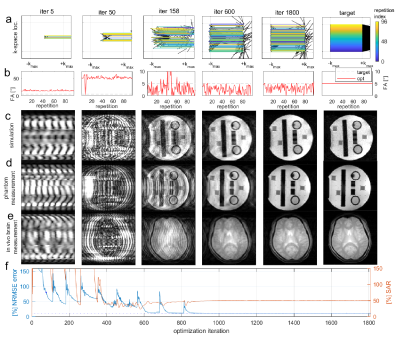Alexander Loktyushin1,2, Kai Herz1,3, Nam Dang4, Felix Glang1, Anagha Deshmane1, Simon Weinmüller4, Arnd Doerfler4, Bernhard Schölkopf2, Klaus Scheffler1,3, and Moritz Zaiss1,3
1Max Planck Institute for Biological Cybernetics, Tübingen, Germany, 2Max Planck Institute for Intelligent Systems, Tübingen, Germany, 3Eberhard Karls University Tübingen, Tübingen, Germany, 4University Clinic Erlangen, Erlangen, Germany
1Max Planck Institute for Biological Cybernetics, Tübingen, Germany, 2Max Planck Institute for Intelligent Systems, Tübingen, Germany, 3Eberhard Karls University Tübingen, Tübingen, Germany, 4University Clinic Erlangen, Erlangen, Germany
We propose a framework — MRzero — that allows automatic invention of MR sequences. At the core of the framework is a differentiable forward process allowing to simulate image measurement process and reconstruction.

Figure 1: MRzero schematic. Figure a) shows the general MRI pipeline from spin system to reconstructed image. A differentiable MR scanner simulation implements Bloch equations for signal generation. (b): The output of forward process is compared to the target image, analytical derivatives w.r.t. sequence parameters are computed using auto-differentiation, and gradient descent is performed in parameter space to update sequence parameters. (c) Final or intermediate sequences can then be applied at the real scanner using the pulseq framework7.

Figure 2: Learning RF and spatial encoding. Row a: k-space sampling at different iterations, Row b: flip angles over measurement repetitions. Row c: simulation-based reconstruction at different iterations 9, 99, 255, 355, and 1000. row d: phantom measurement, row e: in vivo brain scan. Row f: training error curve. An animated version can be found at: www.tinyurl.com/y4blmpe7. Target sequence: 2D transient gradient- and RF-spoiled GRE, matrix size 96, TR = 25 ms, TE = 3.2 ms, FA=5˚.